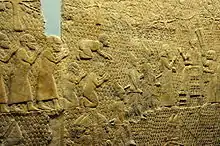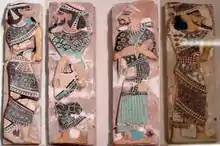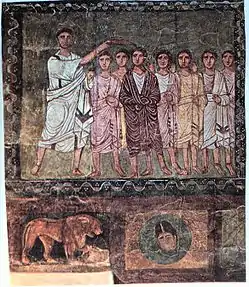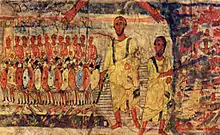Hebrews
The terms Hebrews (Hebrew: עברים / עבריים, Modern: ʿIvrim / ʿIvriyyim, Tiberian: ʿIḇrîm / ʿIḇriyyîm; ISO 259-3: ʕibrim / ʕibriyim) and Hebrew people are mostly taken as synonymous with the Semitic-speaking Israelites, especially in the pre-monarchic period when they were still nomadic. However, in some instances it may also be used in a wider sense, referring to the Phoenicians, or to other ancient groups, such as the group known as Shasu of Yhw on the eve of the Bronze Age collapse,[1] which, although not an ethnonym,[2][3] appears 34 times within 32 verses[4][5][6] of the Hebrew Bible.

| Part of a series on |
| Jews and Judaism |
|---|
 |
|
By the time of the Roman Empire, Greek Hebraios could refer to the Jews in general, as Strong's Hebrew Dictionary puts it, "any of the Jewish Nation",[7] and at other times more specifically to the Jews living in Judea. In early Christianity, the Greek term Ἑβραῖος refers to Jewish Christians as opposed to the gentile Christians and Judaizers (Acts 6:1 among others). Ἰουδαία is the province where the Temple was located.
In Armenian, Italian, Greek, the Kurdish languages, Old French, Serbian, Russian, Romanian and a few other languages the transfer of the name from Hebrew to Jew never took place, and "Hebrew" is the primary word used for a Jew.[8][9][10] The translation of "Hebrew" is used also in the Kurdish language and was once used also in French.
With the revival of the Hebrew language and the emergence of the Hebrew Yishuv, the term has been applied to the Jewish people of this re-emerging society in Israel or the Jewish people in general.
Etymology
The definitive origin of the term "Hebrew" remains uncertain.[11] The Biblical term Ivri (עברי; Hebrew pronunciation: [ʕivˈri]), meaning "to traverse" or "to pass over", is usually rendered as Hebrew in English, from the ancient Greek Ἑβραῖος and the Latin Hebraeus. The Biblical word Ivri has the plural form Ivrim, or Ibrim.
The most generally accepted hypothesis today[12][13][14] is that the text intends ivri as the adjective (Hebrew suffix -i) formed from ever (עֵבֶר) 'beyond, across' (avar (עָבַר) 'to cross, to traverse'), as a description of migrants 'from across the river' as the Bible describes the Hebrews.[15] It is also supported by the 3rd century BCE Septuagint, which translates ivri to perates (περατής),[16] a Greek word meaning 'one who came across, a migrant',[17] from perao (περάω) 'to cross, to traverse',[18] as well as some early traditional commentary.[19] Gesenius considers it the only linguistically acceptable hypothesis.[20] The description of peoples and nations from their location 'from across the river' (often the river Euphrates, sometimes the Jordan river) was common in this region of the ancient Near-East:[21] it appears as eber nari in Akkadian[22][23] and avar nahara in Aramaic (both corresponding to Hebrew ever nahar), the Aramaic expression's use being quoted verbatim in the Bible, for example in an Aramaic letter sent to the King of Persia in the Book of Ezra[24] or in the Book of Nehemiah,[25] sometimes rendered as Trans-Euphrates.[26]

Genesis 10:21 refers to Shem, the elder brother of Ham and Japheth and thus the first-born son of Noah, as the father of the sons of Eber (עבר), which may have a similar meaning.
Some authors argue that Ibri denotes the descendants of the biblical patriarch Eber (Hebrew עבר), son of Shelah, a great-grandson of Noah and an ancestor of Abraham,[30] hence the occasional anglicization Eberites.
Since the 19th-century CE discovery of the second-millennium BCE inscriptions mentioning the Habiru, many theories have linked these to the Hebrews. Some scholars argue that the name "Hebrew" is related to the name of those seminomadic Habiru people recorded in Egyptian inscriptions of the 13th and 12th centuries BCE as having settled in Egypt.[31] Other scholars rebut this, proposing that the Hebrews are mentioned in later texts of the 3rd Intermediate Period of Egypt (11th century BCE) as Shasu of Yhw,[32] while some scholars[33] consider these two hypotheses compatible, Ḫabiru being a generic Akkadian form parallel to Hebrew ʿivri from the Akkadian equivalent of ʿever 'beyond, across' describing foreign peoples 'from across the river',[34] where the letter ayin (ʿ) in Hebrew corresponds to ḫ in Akkadian[35] (as in Hebrew zeroaʿ corresponding to Akkadian zuruḫ[36]).
Use as synonym for "Israelites"

In the Hebrew Bible, the term Hebrew is normally used by foreigners (namely, the Egyptians) when speaking about Israelites and sometimes used by Israelites when speaking of themselves to foreigners.[37] In Genesis 11:16–26, Abram is described as a descendant of Eber, from which some writers claim the designation Hebrew is derived. In Genesis 14:13, Abraham is described as Avram Ha-Ivri ("Abram the Hebrew"), and which translates literally as "Abram the one who stands on the other side."
Israelites are defined as the descendants of Jacob, son of Isaac, grandson of Abraham. Eber, an ancestor of Jacob (seven generations removed), is a distant ancestor of many people, including the Israelites, Ishmaelites, Edomites, Moabites, Ammonites, Midianites, Amalekites and Qahtanites.
According to the Jewish Encyclopedia the terms Hebrews and Israelites usually describe the same people, stating that they were called Hebrews before the conquest of the Land of Canaan and Israelites afterwards.[38] Professor Nadav Na'aman and others say that the use of the word "Hebrew" to refer to Israelites is rare and when used it is used "to Israelites in exceptional and precarious situations, such as migrants or slaves."[39][40]
Use as synonym for "Jews"

By the Roman period, "Hebrews" could be used to designate the Jews, who use the Hebrew language.[41] The Epistle to the Hebrews, one of the books of the New Testament, was probably directed at Jewish Christians.[42]
In some modern languages, including Armenian, Greek, Italian, Romanian, and many Slavic languages, the name Hebrews (with linguistic variations) is the standard ethnonym for Jews; but in many other languages in which both terms exist, it is currently considered derogatory to call Jews "Hebrews".[43][44]
Among certain left-wing or liberal circles of Judaic cultural lineage, the word "Hebrew" is used as an alternatively secular description of the Jewish people (e.g., Bernard Avishai's The Hebrew Republic or left-wing wishes for a "Hebrew-Arab" joint cultural republican state).
Use in Zionism
Beginning in the late 19th century, the term "Hebrew" became popular among secular Zionists; in this context the word alluded to the transformation of the Jews into a strong, independent, self-confident secular national group ("the New Jew") sought by classical Zionism. This use died out after the establishment of the state of Israel, when "Hebrew" was replaced with "Jew" or "Israeli".[45]
References
Bibliography
- Ancient Judaism, Max Weber, Free Press, 1967, ISBN 0-02-934130-2
- Zeitlin, Solomon (1953). "The Names Hebrew, Jew and Israel: A Historical Study". The Jewish Quarterly Review. 43 (4): 365–379. doi:10.2307/1453236. JSTOR 1453236.
- Richard Kugelman, "Hebrew, Israelite, Jew in the New Testament." In The Bridge: A Yearbook of Judaeo-Christian Studies, Vol. 1, edited by John M. Oesterreicher and Barry Ulanov, 204–224. New York: Pantheon Books, 1955.
- Harvey, Graham (2001). The True Israel: Uses of the Names Jew, Hebrew, and Israel in Ancient Jewish and Early Christian Literature. BRILL. ISBN 0-391-04119-3.
Notes
- "Index of /epsd". psd.museum.upenn.edu. Retrieved March 3, 2019.
- Eerdmans Dictionary of the Bible, p.567, "Hebrew, Hebrews... A non-ethnic term"
- Collapse of the Bronze Age, p. 266, quote: "Opinion has sharply swung away from the view that the Apiru were the earliest Israelites in part because Apiru was not an ethnic term nor were Apiru an ethnic group."
- "Genesis 1:1 (KJV)". Blue Letter Bible. Retrieved March 3, 2019.
- "עִבְרִי - Hebrew - iv.ri - H5680 - Word search - ESV - STEP". www.stepbible.org. Retrieved March 3, 2019.
- Brown; Driver; Briggs; Gesenius (1952). The NAS Old Testament Hebrew Lexicon. Oxford University Press. ISBN 0-198-64301-2. Retrieved September 6, 2014.
- "Genesis 1:1 (NKJV)". Blue Letter Bible. Retrieved March 3, 2019.
- Administrator. "Jewish Museum of Venice - homepage". Museoebraico.it. Retrieved August 4, 2012.
- "Jewish Ghetto of Venice". Ghetto.it. Retrieved August 4, 2012.
- Yann Picand, Dominique Dutoit. "translation of evreiesc in English | Romanian-English dictionary". Translation.sensagent.com. Retrieved August 4, 2012.
- "Hebrew". Encyclopædia Britannica. Chicago. 2009.
- Gesenius, H. W. F. (ed.). "Hebrew and Chaldee Lexicon to the Old Testament".
- "Genesis 14:13". Cambridge Bible for Schools and Colleges.
- Ernest, Klein (ed.). "A Comprehensive Etymological Dictionary of the Hebrew Language for Readers of English".
- "Joshua 24:3 But I took your father Abraham from beyond the Euphrates and led him through all the land of Canaan, and I multiplied his descendants. I gave him Isaac". biblehub.com. Retrieved August 4, 2020.
- "Abram the Hebrew = Αβραμ τῷ περάτῃ".
- A Greek-English Lexicon, Henry George Liddell and Robert Scott http://www.perseus.tufts.edu/hopper/text?doc=Perseus%3Atext%3A1999.04.0057%3Aentry%3Dperath%2Fs
- "Henry George Liddell, Robert Scott, A Greek-English Lexicon, περάω". www.perseus.tufts.edu. Retrieved August 4, 2020.
- "Bereishit Rabah 42:8, on the first mention of the word ivri in the Bible, the words 'Abram the ivri' of Genesis 14:13".
- Wilhelm Gesenius. Gesenius' Hebrew Grammar.
- Beattie, D. R. G.; Davies, Philip R. (March 1, 2011). "What Does Hebrew Mean?1". Journal of Semitic Studies. 56 (1): 71–83. doi:10.1093/jss/fgq059. ISSN 0022-4480.
- A Concise Dictionary of Akkadian, Jeremy Black, Andrew George, Nicholas Postgate, page 64
- Example: definition of eber nari in Akkadian-language Treaty of Esarhaddon King of Assyria with Baal King of Tyre (British Museum, London, UK)
- Ezra 4:11, New American Standard Bible: "To King Artaxerxes: Your servants, the men in the region beyond the River" (Aramaic: enash avar nahara) https://biblehub.com/ezra/4-11.htm https://www.sefaria.org.il/Ezra.4.11?lang=he
- "Nehemiah 2:7 Hebrew Text Analysis". biblehub.com. Retrieved August 4, 2020.
- "Nehemiah 2:7 in the New International Version translation: "may I have letters to the governors of Trans-Euphrates"". biblehub.com. Retrieved August 4, 2020.
- "Shasu or Habiru: Who Were the Early Israelites?". The BAS Library. August 24, 2015. Retrieved March 3, 2019.
- "Israelites as Canaanites". www.fsmitha.com. Retrieved March 3, 2019.
- "Inside, Outside: Where Did the Early Israelites Come From?". The BAS Library. August 24, 2015. Retrieved March 3, 2019.
- "EBER - JewishEncyclopedia.com". www.jewishencyclopedia.com. Retrieved March 3, 2019.
- "Hebrew - people". Encyclopedia Britannica. Retrieved March 3, 2019.
- Rainey, Anson (November 2008). "Shasu or Habiru. Who Were the Early Israelites?". Biblical Archaeology Review. Biblical Archaeology Society. 34 (6 (Nov/Dec)).
- "Klein Dictionary, עִבְרִי". www.sefaria.org. Retrieved August 4, 2020.
- see above the discussion of the Akkadian and Aramaic expressions eber nari and avar nahara respectively, corresponding to Hebrew ever nahar, being widely used in the ancient Near-East.
- Klein, Ernest (1971). A Comprehensive Etymological Dictionary Of The English Language. p. 692.
- "Search Entry". www.assyrianlanguages.org. Retrieved August 4, 2020.
- William David. Reyburn - Euan McG. Fry - A Handbook on Genesis - New York - United Bible Societies - 1997
- "HEBREW". Jewishe Encyclopedia. Retrieved March 3, 2019.
- Carolyn Pressler (2009). "Wives and Daughters, Bond and Free: Views of Women in the Slave Laws of Exodus 21.2-11". In Bernard M. Levinson; Victor H. Matthews; Tikva Frymer-Kensky (eds.). Gender and Law in the Hebrew Bible and the Ancient Near East. p. 152. ISBN 978-0567545008.
- Carvalho, Corrine L. (2010). Encountering Ancient Voices: A Guide to Reading the Old Testament. Anselm Academic. p. 68. ISBN 978-1599820507.
- "Hebrews". Retrieved March 3, 2019 – via The Free Dictionary.
- "Epistle to the Hebrews - Online Information article". encyclopedia.jrank.org. Archived from the original on March 6, 2019. Retrieved March 3, 2019.
- Yitzhaq Feder, in an online-article (c. 2013), "Don't Call Me Hebrew! The Mysterious Origins of the First Anti-Semitic Slur" suggests the term's present-day derogatory quality goes back to the origins of writing about the Jewish people.
- E. G. Kraeling, "The Origin of the Name Hebrews", American Journal of Semitic Languages and Literatures 58/3 (July 1941): 237-253.
- Shavit, Yaacov (1987). The New Hebrew Nation. Routledge. pp. xiv. ISBN 0-7146-3302-X.
External links
![]() Media related to Hebrews at Wikimedia Commons
Media related to Hebrews at Wikimedia Commons